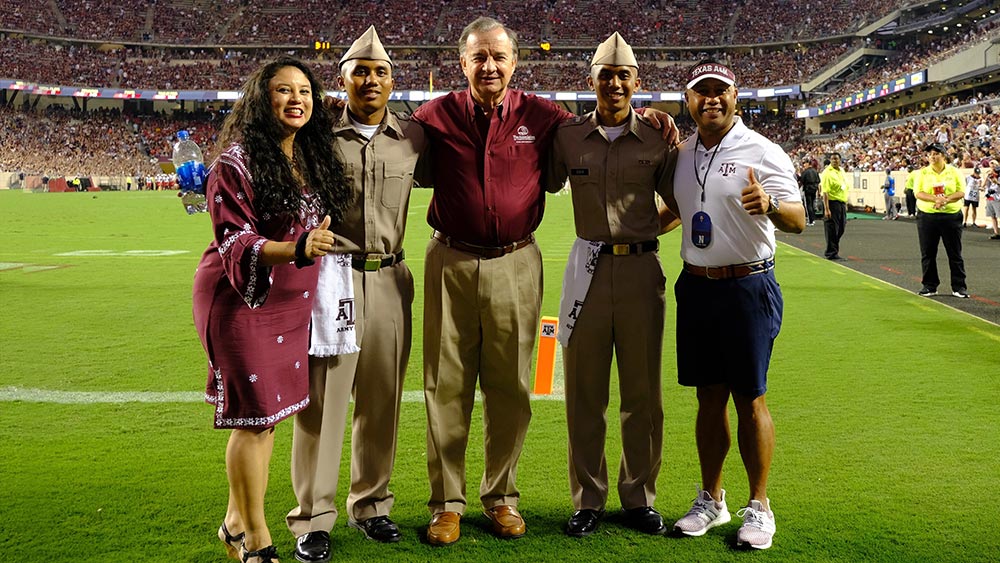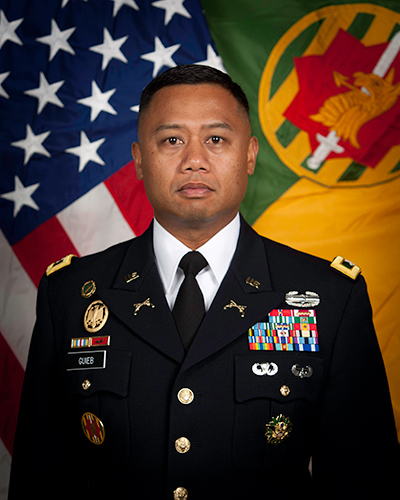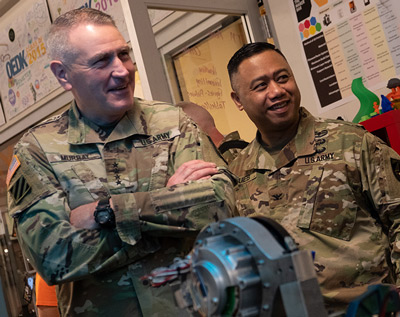
COLLEGE STATION – His entire life has prepared Rosendo “Ross” Guieb to lead The Texas A&M University System’s new complex for next-generation battlefield readiness.
He grew up in a household with his paternal grandfather, a Filipino soldier in World War II who survived the Bataan Death March and schooled his grandson on the horrors of war.
As a youth, Guieb learned from grandparents, parents, uncles and aunts about the importance of resilience, of thinking long term and of serving something bigger than himself.

His upbringing led him to join the U.S. Army, where he refined those life lessons and shared them with soldiers under his command. Over a 29-year career, Guieb rose to the rank of colonel, learned how to manage large organizations and, most recently, how to reform them.
As Guieb retires to become executive director of the Bush Combat Development Complex (BCDC), two of his three sons are sophomores in the Texas A&M Corps of Cadets.
“Our mission is not primarily about today’s soldiers,” Guieb said. “It is really about the future soldiers. It’s about our kids and our grandkids, making sure they have the right concepts, the right structures and the right equipment to fight and win convincingly on the future battlefield.”
Guieb is describing his new mission managing the BCDC, a high-tech complex being built on the RELLIS Campus in Bryan, Texas, to help accelerate military innovation.
He also is describing his final four years in the Army, when he served in key roles connected with standing up Army Futures Command (AFC), a massive reorganization to streamline Army modernization.
“Ultimately,” Guieb said, “our mission is to have the equipment, the structures and the concepts so right, so strong, that they deter any other nation from ever wanting to go to war with the United States.”
Guieb was born in 1968 in San Francisco to Filipino immigrant parents. His mother was a biochemist; and his father worked in production for Anheuser Busch. Both worked long hours, saving to buy a home in the suburbs. His grandparents, who lived nearby, watched Guieb and his older sister every week. Once his parents could afford to buy their dream home, the grandparents moved in, too.
“We were very close,” Guieb said.
When he and his sister were older, their grandparents moved back to their ancestral home. Guieb would fly alone to visit them in the Philippines.
“My grandfather told me of his experiences with the death march,” he recalled. “I learned about how gruesome war was, really. He called war an unnatural act that mankind brought to Earth.”
Guieb found himself interested in joining the Army. In addition to both of his grandfathers being Filipino soldiers, Guieb had uncles who had immigrated and joined the U.S. military. One was a Marine. Another was in the Air Force.
“They served and that’s number one for me,” Guieb said. “I didn’t want to go to war. It was about serving. Being in the Army stood for more than just being an individual.”
Commissioned and assigned to be a military police officer, Guieb was drawn to the comradery among soldiers.
“You meet and really get close to a cross section of people,” he said. “You figure out that you all sweat the same way; you all get tired the same way.”
Guieb enjoyed how his career helped him see much of the world. He had majored in international relations at the University of California-Santa Barbara.
He led troops in noncombat missions in Honduras, Panama, Haiti and Bosnia. He served in Hawaii, Alabama and Missouri. In an officer exchange program with Great Britain, he managed military security for the queen.
After 9/11, Guieb served two combat tours in Iraq and one in Afghanistan. In 2014, he commanded the Army’s largest military police brigade at Fort Hood, Texas, with more than 4,400 soldiers and 300 civilians.
In 2017, Guieb was on his third tour at the Pentagon when he was asked to serve as executive officer and chief of staff to a newly forming task force. Then under secretary of the Army Ryan McCarthy established the group to figure out how best to consolidate the Army’s modernization process under a single command.
“Our job was to tease out all the foundational pillars,” Guieb said. “We had to look at processes, authorities, policies and budgets. We had to think through the principles behind the changes and then sell it all back to the leadership. The pressure to get this right was pretty daunting.”
McCarthy, who is now secretary of the Army, had recognized the war on terror kept the Army so focused on urgent battlefield issues that it had fallen behind in terms of preparing for future warfare.
He and other Army leaders also knew they needed to accelerate innovation in research and development. The Army’s modernization process had been designed for the Cold War era and its immediate aftermath.

“The world has changed,” Guieb said. “Failing to modernize risks leaving us with a force that could dominate the last war but be irrelevant to tomorrow’s security. History makes clear that America has no preordained right to victory on the battlefield. This is about deterrence, but decisive victory if called upon.”
Once the task force completed its work, Guieb became executive officer for McCarthy as he was implementing task force recommendations, creating AFC and selecting Austin as its headquarters.
In 2018, Guieb moved to Austin to serve as executive officer to Gen. John M. Murray, the first commanding general of AFC, as Murray fully stood up the command.
Now Guieb has moved to the College Station area with his wife, Kathy. He joins the staff of Texas A&M, one of a handful of U.S. research universities forging partnerships with AFC to pursue emerging technologies.
Unlike other universities, however, Texas A&M is building a $200 million, highly instrumented testing complex where the Army can experiment with prototypes alongside stakeholders from any academic institution and private industry.
Guieb noted that Texas A&M offers the Army a unique combination of assets, including the Corp of Cadets that his sons are now part of. The university produces more military officers than any other outside of the U.S. service-branch academies.
“Texas A&M is a perfect convergence of world-class research, patriotism toward our country, and the passion and knowhow to do national security work,” Guieb said. “To me, that convergence, that combination, is why Texas A&M is so special.”
